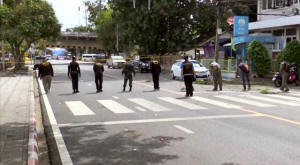|
Series of blasts hit resort towns in
southern Thailand
 Send a link to a friend
Send a link to a friend
 [August 12, 2016]
By Prapan Chankaew [August 12, 2016]
By Prapan Chankaew
HUA HIN, Thailand (Reuters) - A series of
blasts hit three of the most popular tourist resorts as well as towns in
southern Thailand on Thursday and Friday, killing four people and
wounding dozens, days after the country voted to accept a
military-backed charter in a referendum.
Four bombs exploded in the upscale resort of Hua Hin, about 200 km (125
miles) south of Bangkok on Thursday evening and Friday morning, killing
two people and wounding at least 24.
Other blasts hit the tourist island of Phuket, a resort town in Phang
Nga province, and Surat Thani, a city that is the gateway to islands
such as Koh Samui in Thailand's Gulf.
Hua Hin is home to the Klai Kangwon royal palace, which translates as
"Far from Worries Palace", where King Bhumibol Adulayadej, the world's
longest reigning monarch, and his wife, Queen Sirikit, have often stayed
in recent years, until both were hospitalized.
Friday was a public holiday in Thailand to mark the queen's birthday,
which is celebrated as Mother's Day.
No group has claimed responsibility, though suspicion could fall on
groups fighting an insurgency in Muslim-majority provinces in southern
Thailand.

SEVEN ATTACKS
Police had intelligence an attack was imminent, but had no precise
information on location or timing, national police chief Chakthip
Chaijinda told reporters in Bangkok on Friday.
"We just didn't know which day something would happen," he said.
Since Sunday's referendum on the constitution, there have been attacks
in seven provinces using improvised explosive devices and firebombs,
Chakthip said.
The devices were similar to those used by separatist insurgents in
southern Thailand, but that did not conclusively show they were the
perpetrators, he said.
Police ruled out any links to international terrorism, as did Thailand's
Foreign Ministry, which said in a statement on Friday: "The incident is
not linked to terrorism but is an act of stirring up public
disturbance."
Thai authorities beefed up security at tourism spots, airports and on
public transport in Bangkok, while Thai junta chief and Prime Minister
Prayuth Chan-ocha expressed frustration about the motives for the
attacks.
"Why now when the country is getting better, the economy is getting
better, and tourism is getting better? We have to ask why and who did
it," he told reporters.

TRAVEL ADVISORY
The attacks are bad news for Thailand's tourist sector, which has been
one of the few bright spots in a sluggish economy.
Tourism accounts for about 10 percent of gross domestic product and
Thailand was expecting a record 32 million visitors this year.
Australia issued a travel advisory saying Australians should "exercise a
high degree of caution" and warned: "Further explosions in any part of
Thailand are possible."
Two blasts on Friday morning in Hua Hin came after twin explosions on
Thursday. One of those was near a bar in a narrow alley in the town late
on Thursday, killing one Thai woman and wounding 21 people, Krisana
said.
Ten of those injured in the Hua Hin blasts were foreigners, Krisana
said, and eight of them were women.
[to top of second column] |

A line of police check the scene after two bomb blasts in the
southern province of Surat Thani, Thailand in this still image from
video August 12, 2016. REUTERS/Reuters TV

The two explosions in Hua Hin late on Thursday were detonated by a
mobile device, police said. The first took place 20 minutes earlier
and about 50 meters from the second, but injured nobody.
Such twin blasts are common in the three Muslim-majority
southernmost provinces of Thailand, where a long-running insurgency
intensified in 2004, with more than 6,500 people killed since then.
The three provinces near the border with Muslim-majority Malaysia
soundly rejected the referendum on the new military-backed
constitution, which passed convincingly in most of the rest of the
country in Sunday's vote.
Violence has occasionally spilled over to areas outside the three
provinces, which were part of a Malay sultanate until it was annexed
by Buddhist-majority Thailand a century ago.
Hua Hin, Phuket and Phang Nga are far from the usual conflict zone,
where attacks are typically aimed at the security forces and
government representatives, not tourists.
In a separate incident on Friday, media reported two bombs had
exploded in the southern province of Surat Thani, killing one person
and wounding five. That came after a blast in Trang, also in the
south, on Thursday, in which one person died and six were wounded.
No one was killed or seriously wounded on Friday in two blasts in
the beach town of Patong on Phuket island or the two explosions in
the beach province of Phang Nga. Authorities also defused two
explosive devices in Phuket on Wednesday, police said.

The head of Interpol in Thailand, Police Major General Apichat
Suriboonya, told Reuters it appears the bombs were meant more to
send a message rather than cause death and destruction. "But the
thing is, if you observe the bombs, they are not targeted to kill
people but to send a message to some groups. It could be a domestic
issue."
Small bombs have been used frequently for attacks during periods of
unrest over the past decade of political turmoil but have been rare
since the military seized power in a 2014 coup in Thailand.
The latest bombings came almost a year after an attack on a Hindu
shrine, crowded with tourists in central Bangkok, killed 20 people
and wounded more than 120. Police have accused two ethnic Uighur
Muslims from China for the Aug. 17, 2015, attack.
(Additional reporting by Orathai Sriring, Amy Sawitta Lefevre,
Panarat Thepgumpanat, Surapan Boonthanom and Kitiphong Thaichareon;
Writing by Simon Webb; Editing by Paul Tait and Bill Tarrant.)
[© 2016 Thomson Reuters. All rights
reserved.]
Copyright 2016 Reuters. All rights reserved. This material may not be published,
broadcast, rewritten or redistributed.
 |